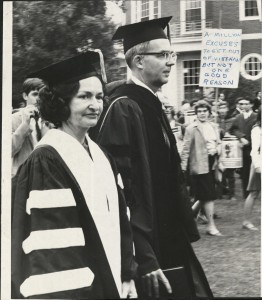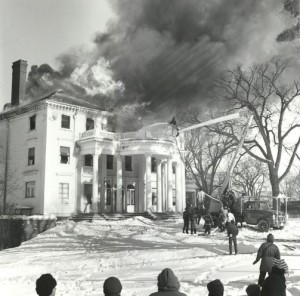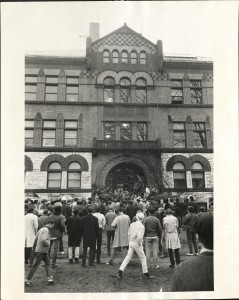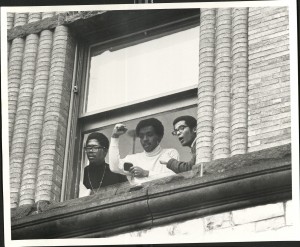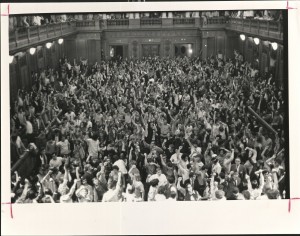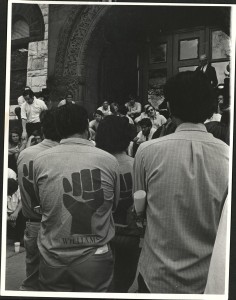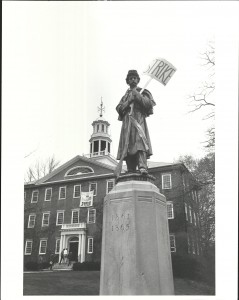Highlights, 1967-1971, from the Williams Record
Editor’s Note:
- Russ Pulliam, then the Record Editor and now still in the newspaper business, culled these Record items to stir our memories. A few other contributors have added time-line items. Photos from the College Archives illustrate some items.
- Reflections on any item or event are welcome! For example, see the “Classmate Reflections” link to Paul Lieberman’s thoughts on the 10/10/67 item – Lady Bird Johnson’s campus visit. Want to make a further comment? Just use the “Comment” box at the end.
- Have a reflection of your own to offer? A photo? We would be delighted to include your thoughts. Please send to: [email protected]
FALL 1967
9/7/67 — Our class of 333 freshmen came to campus from 242 schools and 39 states and foreign countries.
9/22/67 – Political Science Prof. James McGregor Burns predicted a Lyndon Johnson re-election victory for 1968, under the conventional wisdom of an advantage for an incumbent.
9/26/67 — John Kitchen ’69, president of the Young Democrats, said he would be starting a chapter of the Americans for Democratic Action. Bob Gillmore, ’68, launched the first campus affiliate of the Ripon Society, the liberal Republican organization.
10/10/67 — Mrs. Lyndon B. Johnson received an honorary degree at the fall convocation on environmental studies. An anti-war walkout by 46 students was overshadowed by a standing ovation for the First Lady.
|
11/1/67 — The Committee on Action and Resistance blocked a CIA recruiter from interviewing students, prompting Political Science Prof. MacAlister Brown to complain of a “tyranny of the militant.”
11/10/67 — Harvard Prof. Henry Kissinger visited Williams and called for an American policy to allow a South Vietnamese government to be self-sustaining without U.S. military help.
11/21/67 — Sophomore running back Jack Maitland led the college to an undefeated season in football, with only a tie against Trinity.
SPRING 1968
1/11/68 – Fort Hoosac House burned down in snowy, cold weather, at 74 years old.
|
1/20/68 — Senator Wayne Morse asks a Chapin Audience “What is our Future in the Far East?”
2/9/68 — More than 500 students petitioned President Sawyer to ban military recruitment on campus. Football and basketball star Sandy Smith was elected College Council president.
3/5/68 — Williams Students for McCarthy attracted about 25 students to New Hampshire to join the campaign of Sen. Eugene McCarthy in his historic March 12 challenge to President Johnson.
3/12/68 — “Sanity and reason do not exist in the Republican Party,” wrote Pat Dunn ’70 in an analysis of Richard Nixon’s lead for the Republican presidential nomination, based on interviews he had in Washington.
4/20/68 — The Williams Afro-American Society proposed Martin Luther King Scholarships along with faculty and curriculum revisions, in response to the assassination of Martin Luther King.
4/26/68 — Political Science Prof. Fred Schuman said that President Johnson’s attempts at peace talks to end the Vietnam War were bound to fail because the United States had no business in Asia. “Moscow and Peking are quite capable of supplying North Vietnam and the Viet Cong with ample weapons to continue the war indefinitely,” he said.
5/3/68 — Acting college chaplain John Lawton was elected a delegate to the Democratic National Convention, supporting Eugene McCarthy and defeating Prof. James M. Burns, a supporter of Sen. Robert Kennedy.
6/9/68 — Urban League Executive Director Whitney Young and New York Times columnist James Reston spoke at a sober commencent event, coming right after the assassination of Sen. Robert Kennedy.
FALL 1968
9/20/68 – Prof. James M. Burns said the recent Democratic National Convention was one of the greatest in history, praising his party for “debating the issues and purging itself of non-liberal, non-democratic institutions.”
10/1/68 – Faculty Dean Dudley Bahlman announced an exchange student program with Vassar College to start in the spring semester.
10/11/68 – The trustees voted to have six remaining fraternities leave the Williams campus.
11/5/68 – Richard Nixon was elected 46th president.
SPRING 1969
1/10/69 – The college faculty endorsed a committee plan for coeducation.
2/11/69 — Vassar transfer students seemed ecstatic about their time at Williams, with one student declaring: “After one week at Williams they’re going to have to drag me by my hair back to Vassar.”
4/9/69 – The four-day occupation of Hopkins Hall by the Afro-American Society ended. The building had been occupied by the Society due to the administration’s response to 15 demands presented to Williams by the Society. The main problem issue was the establishment of an Afro-American Cultural Center with residential facilities for black students wishing to live there. An accord ending the occupation was reached following private talks between the administration and the Society.
|
|
4/25/69 — Sen. Edmund Muskie spoke at the Give A Damn weekend, designed to build concern for urban problems. To end poverty in 4-6 years he proposed higher taxes on the wealthy.
5/16/69 — Future presidential candidate Morris Udall, a member of the House of Representatives from Arizona, spoke against President Nixon’s Vietnam policy, also visiting his son Mark, a freshman. An outstanding golfer, Mark later would become a U.S. senator from Colorado.
6/8/69 — Sen. Edward Kennedy was the commencement speaker for graduation, in addition to receiving an honorary degree.
FALL 1969
9/26/69 – Provost Stephen Lewis contested a Wash Post story suggesting that Williams was going coed to boost enrollment and revenues. “We’re not running a trade school, and we weren’t trying to save ourselves from becoming a trade school by going coed.”
10/17/69 – After the Oct. 15 moratorium day President Sawyer sent 2100 signatures in a petition calling for an end to the Vietnam War.
10/24/69 – President Sawyer met with Sen. Edward Kennedy as part of his appointment by President Nixon to the Task Force on Priorities in Higher Education. Assemblyman Michael Dukakis called for better state transportation plans in a visit to the college in his bid to become lieutenant governor. Almost 20 years later he would be the Democrats’ presidential candidate.
10/31/69 – Dogs were banned from dining halls and the snack bar, under threat of $10 fines.
11/7/69 — In the debate over student elections to college committees, English Prof. Charles Samuel offered some wisdom. “The number of imaginative committees in the history of the world is not very high,” he said. “An old time-honored academic policy is when you can’t solve a problem, form a committee.”
11/14/1969 – Will Buck wrote an extensive Record story on the pros and cons of freshman segregation.
12/9/69 — Russ Pulliam and Paul Lieberman were named editors of the Record for 1970, and Jerry Carlson became business manager. Liebo was identified as a low handicap golfer and said he got a haircut in order to work with Pulliam.
SPRING 1970
1/9/70 – The first women students came to campus from Vassar, in preparation for admission of 125 freshmen women in the fall of 1971. Record reporter Jim Deutsch offered a careful review of the men’s restrooms on campus.
2/10/70 — Nancy McIntire was named as the first woman dean in the college’s history, coming from Radcliffe as an assistant dean to help with coeducation.
2/13/70 — Math Prof. Neil Grabois was slated to become college dean, replacing John Hyde. “We are facing a facing a challenge with the addition of women to the college,” Grabois said.
2/27/70 — Liebo wrote an eloquent defense of coeducation. “How do we relate to each other as real people without losing sight of our differences and without treating each other as objects?”
3/3/70 — Steve Lawson played Mercury and Joan Hertzberg performed as Night in Amphityron at the Adams Memorial Theatre.
3/10/70 — Sophomore Vernon Manley hit a 20-foot jump shot for a 73-71 victory over Amherst. Associate Dean Peter Frost objected to utopian claims for recreational drug use, declaring: “Only the unclouded human mind can solve the problems that man himself has created.”
3/18/70 — The College Council voted for limited freshmen inclusion with upper class students in the residential house system.
4/10/70 — “Williams men are not ready for women’s liberation,” wrote Record reporter Jack Booth in reference to immature student reaction to two speakers from the Bread & Roses Women’s liberation group from Boston.
5/1/70 — James MacGregor Burns wrote a cover story for the Saturday Review magazine on his new book, Roosevelt, Soldier of Freedom.
5/5/70 — Williams students went on strike to protest the U.S. invasion of Cambodia. English Prof. Charles Samuels said he would still have class.
|
|
|
|||||
| Chapin Hall | Strike fist | Civil War statue | |||||
6/7/70 — Retiring tennis coach Clarence Chaffee received an honorary degree for his many years of coaching tennis, squash and soccer. New York City Mayor John Lindsay gave the commencement address.
FALL 1970
9/11/70 — 98 women joined a 1974 class of 345 first year students. The rest of the student body had until October 15 to finish spring semester assignments, postponed for the strike.
9/29/70 — Soccer coach Jay Healy ‘68 left coaching to run for the Massachusetts legislature.
10/2/70 — Reviewing the new movie Patton, Ron Ross ’71 drew some parallels between the World War II general and President Nixon.
10/6/70 — Sen. George McGovern visited the college after campaigning in Vermont for Phil Hoff ’48, who was running for the U.S. Senate.
10/9/70 — Jack Maitland started at running back for the Baltimore Colts, earning praise from quarterback John Unitas: “He should be a great asset to us.”
10/13/70 – Assoc. Dean Peter Frost announced the end of hours restricting visitors in campus housing.
11/2/70 — Jewish Defense League leader Meir Kahane spoke at the college, warning of American trends similar to pre-Hitler Germany in 1920.
11/6/70 — Republican Charles Goodell ’48, appointed to succeed Bobby Kennedy in 1968, lost his bid to Conservative James Buckley in the New York Senate race. Record reporter Ned Temko interviewed several coeds, including one who said that too many guys were still going on roadtrips to other schools.
11/17/70 — Williamstown resident Andrew Berody persisted in pressing trespassing charges against Williams students who spent the night in the hayloft of his barn on Petersburg Road. “I would never sleep in President Sawyer’s backyard,” Berody said.
12/11/70 — After ten years on the job President Sawyer was planning a two-month sabbatical in southern France, in a village with one English-speaking person, in a house with no telephone.
Offensive tackle Rob Farnham was named to the All-East football team for the Eastern College Athletic Association. John Untereker led the basketball team to a 89-63 victory over Hartford with 25 points.
SPRING 1971
1/8/71 — Lucky Komisar of the National Organization for Women said women should not be confined to housekeeping and child-rearing in a Jesup Hall speech. She also criticized Sen. Edward Kennedy for his opposition to legal abortion.
Along with Wynne Carvill, Dave Lee, Dick Metzger, Dale Riehl and Ian Fierstein, Paul Lieberman called for student inclusion in tenure review, after political scientist Craig Brown was denied tenure.
1/14/71 — Getting ready for the Super Bowl with the Colts, Jack Maitland told Record reporter Bill Rives: “I finally came to the realization that pro football players are normal people who have normal aches and pains, and normal problems.”
4/27/71 — Among the ads in the Record was an offer for us to purchase diamonds for our upcoming weddings. A BMW was offered for $4,987.
5/4/71 – Ned Temko ’74 and several other Williams students met with Nixon Chief of Staff Bob Haldeman, asking him many questions about the administration’s Vietnam policies.
5/7/71 – A few undergraduate students staged a walk-in at a faculty meeting, to draw attention to barriers between students and faculty.
6/6/71 – Environmentalist Rene Dubos was the speaker at our graduation in Mission Park. Joan Hertzberg was honored as class valedictorian and one of the first seven women to receive a Williams diploma.

